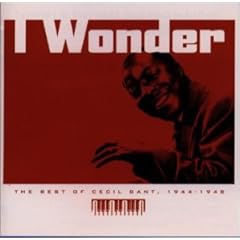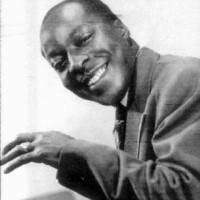Home » Jazz Musicians » Cecil Gant
Cecil Gant
Cecil Gant jumped into the R & B world's consciousness during a war bond rally in downtown Los Angeles in 1944. The 29 year old pianist / singer made a great impression on many in the audience that day and so he was soon in a makeshift recording studio for the small independent Gilt Edge label. The first record released was "I Wonder" / "Cecil's Boogie" on Gilt Edge billed as "The G.I. Sing-sation". Using hidden neighborhood pressing plants and black market supplies of shellac, the record got out on the streets and sold briskly. Gant tried to follow up his huge success with further recordings and he made sporadic personal appearances in the Los Angeles area during these years and while continuing to try and dent the hit charts with further sessions for Gilt Edge. These steady records kept Cecil in the scene as a good vocalist and boogie woogie piano player. "Midnight On Central Avenue" came next and was one of Cecil's best piano tunes. Unfortunately, it did not fare any better than any of the other records in the wake of his one big hit of four years before. In 1949, Gant moved to Bronze Records in Los Angeles and then to Four Star a part of the Gilt Edge group. Gant moved back to his hometown of Nashville, Tennessee, to try and get his life back together both professionally and personally. He made personal appearances at clubs in Nashville and in other areas of Tennessee and Kentucky. He recorded for two hometown labels in the late forties - Jim Bulleit's Bullet label, and Randy Woods Dot label. During the last months of 1949, Downbeat and Swing Time also issued sides by Gant He began in 1950 recording for the Imperial label, but once again there was little interest in the sides and Imperial did not renew his contract. However, he still had his name as an innovator and 4 Star had some records that were unreleased. But slumping sales and airplay elude Cecil Gant and 4 Star Records lets him go and Gant is surprisingly picked up and signed by Decca Records as the venerable old major tries a move into the building R & B field. The first sessions for Decca are marked by trying something new - a change of name for Gant who is listed on the label as Gunter Lee Carr (for his main influence Leroy Carr) and his version of "Goodnight Irene" and the followup record called "We're Gonna Rock" in July of 1950.
Read moreTags
Photos
Music
Recordings: As Leader | As Sideperson


























